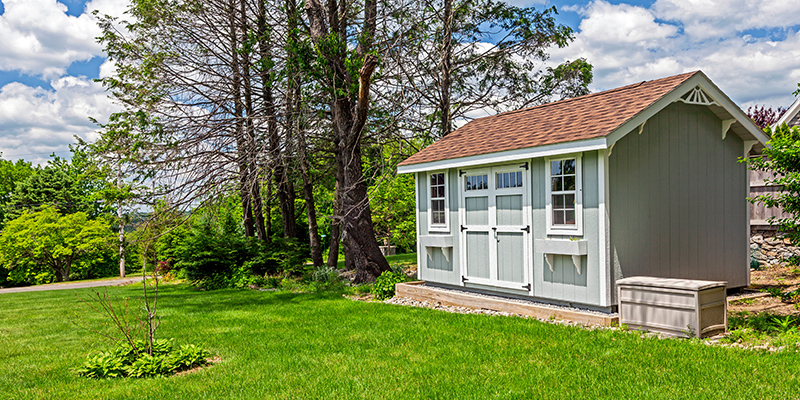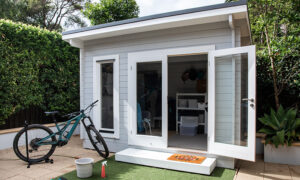Which States Allow Accessory Dwelling Units In HOAs?

Accessory dwelling units in HOAs can be a contentious topic, especially between homeowners and board members. Before turning to an HOA's governing documents for guidance, it is important to check state laws.
Browse By Category
Sign up for Our Newsletter
Accessory dwelling units in HOAs can be a contentious topic, especially between homeowners and board members. Before turning to an HOA’s governing documents for guidance, it is important to check state laws.
What Are Accessory Dwelling Units (ADUs)?
An accessory dwelling unit (ADU) is a secondary housing unit constructed on a single-family residential lot. A single-family dwelling in HOA communities typically has one unit — the main house. However, many homeowners wish to build a second housing unit within the same property where ADUs come in.
An ADU is typically smaller than the main dwelling. It can either stand separately from the main dwelling or be attached to it. Common examples of attached ADUs include a converted garage and a basement apartment. An ADU serves as a separate living space. It normally comes with its own sleeping quarters, bathroom, and kitchen.
There are a few reasons why a property owner would want to build an ADU:
- Generate additional income in the form of rent
- Accommodate family members such as parents, grandparents, and in-laws
- Provide housing for guests or caregivers
With the country facing a housing shortage, ADUs have grown in popularity as a way to cut down on costs while taking advantage of urban infrastructure more efficiently.
State Laws on Accessory Dwelling Units in HOAs
While ADUs offer several benefits, not everyone can build them on a whim. Regulations concerning the construction and use of such dwellings can vary by location. There are zoning ordinances and building codes to watch out for. Homeowners who live in HOA communities also have to go through an additional layer of restrictions.
An association’s governing documents, specifically its CC&Rs, should contain guidelines regarding ADUs. The CC&Rs should outline whether or not ADUs are allowed in the community. Additionally, they should detail any restrictions the HOA may have about ADUs.
Although most governing documents address ADUs in HOAs, residents and board members must also consider state laws. So far, though, California is the only state with laws prohibiting HOAs from banning ADUs altogether.
California Law on ADUs in HOAs
California law prohibits homeowners associations from banning ADUs or imposing unreasonable restrictions.
According to Civil Code Section 4751, a planned development may not include any provision in its governing documents, deeds, or contracts that “either effectively prohibits or unreasonably restricts the construction or use of an accessory dwelling unit or junior accessory dwelling unit on a lot zoned for single-family residential use.”
The single-family residential dwelling must meet the requirements of Article 2 (commencing with Section 66314) or Article 3 (commencing with Section 66333) of Chapter 13 of Division 1 of Title 7 of the Government Code. If an HOA’s documents or rules contain restrictions that contradict Section 4751, they are void and unenforceable.
The same section permits HOAs to enact provisions that impose reasonable restrictions on ADUs and JADUs. The section defines reasonable restrictions as ones that “do not unreasonably increase the cost to construct, effectively prohibit the construction of, or extinguish the ability to construct otherwise” an ADU or JADU that complies with the same articles mentioned above.
Do State and Local Laws Override HOA Rules?
There is often some confusion regarding laws and HOA rules when it comes to precedence. California’s ADU law specifically prohibits HOAs from banning ADUs or imposing unreasonable restrictions. As such, even if an HOA in California enacts a rule or amends its CC&Rs to prohibit ADUs, homeowners can still build them.
Outside of California, several states and local cities may have laws or ordinances that permit owners to build ADUs in places zoned for residential use. State and local laws do override HOA rules, but just because a local law allows something doesn’t automatically mean that the HOA is obligated to allow the same.
Homeowners associations are private entities. If state or local laws don’t prohibit HOAs from imposing certain restrictions, then an HOA may impose them. This applies to accessory dwelling units as well.
An Ongoing Push Towards ADUs
 Accessory dwelling units offer an efficient and economical solution to the housing shortage. As such, more states and municipalities will likely follow California’s lead. As of this writing, most states don’t have HOA laws as comprehensive as the Golden State. However, that is not to say it will stay that way forever.
Accessory dwelling units offer an efficient and economical solution to the housing shortage. As such, more states and municipalities will likely follow California’s lead. As of this writing, most states don’t have HOA laws as comprehensive as the Golden State. However, that is not to say it will stay that way forever.
Legislators from other states continue to advocate for stricter and more detailed laws concerning HOAs. Although California currently supports accessory dwelling units in HOAs, there is no reason to believe that change won’t come soon.
Laws can transform over time. New laws may be introduced, while old laws may be repealed or amended. Due to this, board members should strive to keep up with potential legislative changes. In doing so, they can protect the HOA and themselves from liability.
However, this is usually easier said than done. Board members don’t always have the time or expertise to stay in the loop. Therefore, HOAs should consider hiring an HOA management company or attorney.
Complying With HOA Regulations
Homeowners may want to construct accessory dwelling units in HOAs. However, not all homeowners have the freedom to do this without the approval of their board or architectural committee. Outside of California, many associations restrict ADUs or ban them altogether. To avoid complications and potential penalties, homeowners should check their governing documents for guidance.
Finding a reliable HOA management company isn’t as easy as it seems. If you’re having trouble, start your search using our comprehensive online directory!
RELATED ARTICLES:
- California Accessory Dwelling Unit Law: What’s It All About?
- HOA CC&R: What Is It And Why It’s Important In A Community
- HOA Architectural Committee: Function, Role, and Responsibilities
Trending Now
Related Article
Sign up for Our Monthly Newsletter
Sign up below for monthly updates on all HOA Resource
















